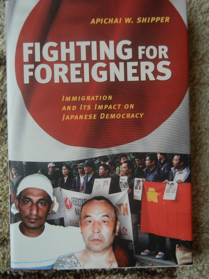Memo #111
By Apichai Shipper – apichai.shipper [at] gmail.com
 As democratic movements spread to the Middle East and North Africa, hopeful observers and nervous authoritarian leaders wondered when they will reach Asia. In fact, they already arrived there in the late 1980s. But another East Asian democratic revolution has been taking place over the past decade, brought about by foreign workers.
As democratic movements spread to the Middle East and North Africa, hopeful observers and nervous authoritarian leaders wondered when they will reach Asia. In fact, they already arrived there in the late 1980s. But another East Asian democratic revolution has been taking place over the past decade, brought about by foreign workers.
Protests by foreign workers against ill treatment and poor living conditions have resulted in the further deepening of democratization in East Asia. The 1993 rally of foreign workers at the Tokyo Metropolitan Government, the 1995 sit-in by Nepalese migrants at the Myongdong Cathedral in downtown Seoul, and the 2005 violent protests by Thai workers at their employer’s property in Taiwan have all resulted in changes.
Between 2000 and 2009, East Asian governments have reformed immigration laws to provide amnesty for unauthorized migrants, and labour laws to give foreign workers equal benefits. In Japan, the government granted “special residence” permits to certain unauthorized foreigners and revised the Nationality Law granting citizenship to previously unqualified children. The Korean government passed the 2004 Employment of Foreign Workers Act and promoted the social integration of foreign wives. Taiwan instituted the “direct employment system” and revised the Statute Governing Relations Between People of Taiwan and Mainland Area.
The ability of foreign migrants to gain sympathy and forge alliances with local activists has been instrumental in bringing these reforms. Local activists formed associations and networks that stimulated public discussion about the marginalization of minorities, foreigners, women, and other underrepresented groups. Their work with foreigners led them to become more critical of their own society and more engaged in civil and political life.
Local activists differed in how they have achieved their goals for policy change. In Japan, independent, small groups linked up with local governments to bring policy change at the local and, sometimes, the national level. In Korea and Taiwan, policy change occurred mostly at the national level through nationally organized networks of activists.
Although commonly characterized as having strong central governments and homogeneous societies, these countries are experiencing a democratic revolution as a result of the influx of foreign workers over the past two decades. Along with foreign workers comes the concern among the local public about their plight. Foreign workers are the wind that feeds the wildfires of democratization in the Asia Pacific.
About the Author:
Apichai W. Shipper is an independent scholar.
Links:
- Shipper, Apichai. Citizenship and Migration (Special Issue), Pacific Affairs, Volume 83, No. 1, March 2010.
- Fighting for Foreigners: Immigration and Its Impact on Japanese Democracy (Book by Apichai Shipper).
- Contesting Foreigners’ Rights in Contemporary Japan, UNC School of Law, 2010.
- Influence of the Weak: The Role of Foreigners, Activism, and NGO Networks in Democratizing Northeast Asia, International Studies Quarterly, 2012. (Forthcoming)
Related Memos:
- Ending Islamic Solidarity in Post 9/11 Pakistan: New Restrictions on Migrants by Nausheen Anwar (Memo #100)
- Self-Searching Migrants: Japanese Temporary Residents in Canada in the Age of High Mobility and Self-Reflexivity by Etsuko Kato (Memo #94) (Japanese translation available here)
- Understanding Indonesian Migration via Labour Brokers by Johan Lindquist (Memo #78)
- Indonesian Domestic Workers’ Rights in Malaysia by Angela Wong (Memo #75)
- Diverging Patterns for Incorporating Immigrants in Korea and Japan by Erin Aeran Chung (Memo #56)
- Regulating Pacific Seasonal Labour in Australia by Pacific Affairs (Memo #18)
